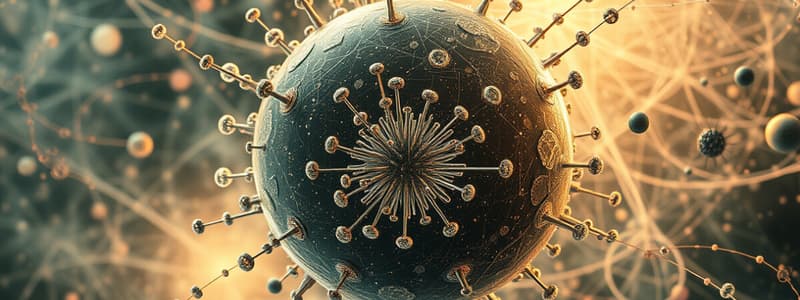Podcast
Questions and Answers
What does the particle theory of matter suggest about the behavior of particles in different states of matter?
What does the particle theory of matter suggest about the behavior of particles in different states of matter?
- Particles move slower in gaseous states than in liquid states.
- Particles stop moving in solid states.
- The speed of particles varies with the state of matter. (correct)
- Particles move at a constant speed regardless of the state.
Which statement best reflects a misconception about the particle theory of matter?
Which statement best reflects a misconception about the particle theory of matter?
- Particles in different states have varying energy levels.
- All particles in solids are static. (correct)
- Particles in liquids exhibit lower movement than in gases.
- The speed of particles is constant in gaseous states.
How is the movement of particles in solids characterized according to the particle theory?
How is the movement of particles in solids characterized according to the particle theory?
- Particles vibrate in fixed positions. (correct)
- Particles collide aggressively with each other.
- Particles flow freely like in liquids.
- Particles move rapidly and independently.
What is the relationship between the speed of particle movement and temperature in liquids?
What is the relationship between the speed of particle movement and temperature in liquids?
Which of the following best represents how particles behave in a gaseous state?
Which of the following best represents how particles behave in a gaseous state?
Flashcards are hidden until you start studying
Study Notes
Particle Theory of Matter
- Explains the behavior of particles in various states of matter: solid, liquid, and gas.
- Asserts that particles are in constant motion regardless of their state.
Movement and Speed
- The velocity of particle movement fluctuates based on the state of matter.
- In solids, particles vibrate in fixed positions with minimal movement.
- In liquids, particles are more mobile, sliding past one another while remaining close together.
- In gases, particles move freely and rapidly, resulting in greater distances between them.
Studying That Suits You
Use AI to generate personalized quizzes and flashcards to suit your learning preferences.




